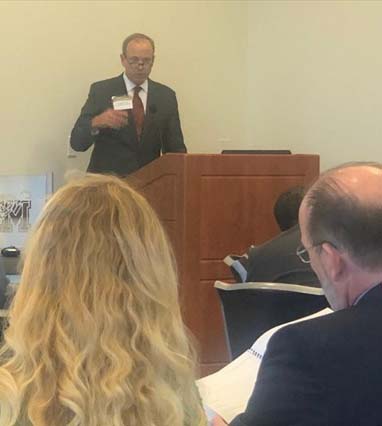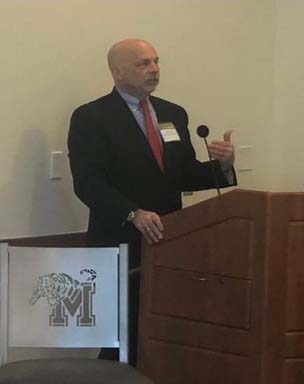
MBA, Partners Launch CONVERGENCE Affordable Housing Initiative in Memphis

A year ago, the Mortgage Bankers Association launched a strategic initiative to help develop stronger and more effective affordable housing partnerships in both the policy and business arenas. Recently, MBA put that commitment to work in Memphis.
CONVERGENCE Memphis, co-led by MBA and the Tennessee Housing Development Agency, is a campaign focused on African American homeownership needs in the Memphis metropolitan area. Begun last October, CONVERGENCE Memphis brings together national, state and local stakeholders to promote affordable and sustainable rental and homeownership opportunities for underserved people and communities, particularly minorities and low-to-moderate income Americans.

Broeksmit, CMB, addresses CONVERGENCE Memphis participants.
MBA President and CEO, Bob Broeksmit, CMB, said when MBA launched the initiative, it pledged to put the “best ideas to work” for unmet housing needs by building new alliances with housing advocates and practitioners, business and community leaders and policymakers and public officials. That vision, he said, is coming together in Memphis.
“The reason for our enthusiasm is that CONVERGENCE Memphis is a great opportunity,” Broeksmit said at a March 3 meeting of leaders at the University of Memphis. “We are enormously excited about it. It’s an opportunity for mortgage lenders to serve more customers, especially in diverse and emerging markets. And it’s the opportunity for more Americans to have access to homeownership and rental housing that is affordable. That’s a very big challenge.”
Steve O’Connor, MBA Senior Vice President for Affordable Housing Initiatives, is responsible for CONVERGENCE Memphis. Over the past year he has worked with Memphis-area public officials, community activists, mortgage industry partners and other stakeholders to establish the initiative, which he says is the start of a multi-year campaign.
“CONVERGENCE Memphis allows us to test ways in which cross-sector collaboration can address the challenges of minority homeownership,” O’Connor said. “The coronavirus pandemic has exacerbated these challenges. Minority households have been struggling—they’re facing employment and health insecurity; they’re taking two steps back; they’re falling deeper into the hole. The communities we are trying to serve—the people who are on the front lines—need our help. We wanted to be creative in our approach. And we want to make sure that any recovery is an equitable one—it has to help the people who we are trying to help in the first place.”

Memphis is an ideal location for the CONVERGENCE Memphis initiative. According to most recent American Community Survey data, the overall share of Memphis households who own their home was 49% in 2015, while homeownership rates for the U.S. were nearly 64%. During that same time, the 49% of homeowners in Memphis consisted of just 43% percent of the city’s African American households, compared to 62% of the city’s White households. At the MSA level, the disparity is even wider—48% for African American households, compared to 75% for white households.
“Memphis, which has been an important focal point in the struggle for civil rights, is a majority-minority city with housing issues—and lots of scar tissue from the Great Recession,” O’Connor said. “We wanted to identify a community where these challenges were obvious, and the housing challenges in Memphis are acute. There’s also Freddie Mac data that identified a large cohort of ‘mortgage ready’ African Americans who are potential homebuyers. It’s a community where we see an opportunity to make a real impact in the coming years.”
Additionally, O’Connor said, Memphis already had a strong network of MBA partners. “There were a number of reliable stakeholders there that I knew we could partner with,” he said. “I knew the head of the Tennessee HFA [Executive Director Ralph Perrey]—I serve on a board with him. And Memphis has a constellation of the potential partners, such as the Memphis MBA.”
From there, MBA’s connections with key stakeholders enabled it to expand the partnerships to broader concentric circles. “After building the core group of local partners, we added Fannie Mae, Freddie Mac, the Federal Home Loan Bank of Cincinnati, Down Payment Resource and CoreLogic, which has been providing some really innovative ideas on land use,” O’Connor said.
After months of planning, CONVERGENCE Memphis officially launched with an event at the University of Memphis on March 3, attended by seven MBA staff members, including Bob Broeksmit, Steve O’Connor, Chief Economist Mike Fratantoni, Chief Diversity and Inclusion Officer Lisa Haynes, along with Eddie Seiler, Krystal Thomas and Brandi Ehrman. Organizing the event involved contributions from all quarters of the association, underscoring an organization-wide commitment to affordable housing.
CONVERGENCE Memphis has established seven workstreams to identify and act on “gaps” in the Memphis housing market:
—Information Gap. “Many people are ready to be homeowners, but they don’t know it because there are these myths that they have to have a large down payment or ‘perfect credit,’” O’Connor said. “We are working to develop the right messages and the right messengers.
—Trust Gap. “There’s a lot of scar tissue from the foreclosure crisis—a distrust of the whole mortgage process,” O’Connor said. “But one of the reasons we were so keen on local partnerships is that we know potential homeowners will trust local non-profit intermediaries who work in the community and understand their needs.”
—Market Gap. “Memphis is predominantly a single-family housing market, but in a lot of the communities we are trying to serve, those houses are of substandard quality,” O’Connor said. “One of our goal is to raise awareness about programs that help with home repairs and renovations. Letting people know that they can get a loan to buy and rehab the house, which then helps revitalize communities.”
—Resource Gap. “There are resources out there that people don’t know about and don’t know how to use, such as down payment assistance programs,” O’Connor said. “We’re working to raise awareness and improve access to these tools.”
The workstreams identified three goals:
–Amplify the outreach and counseling efforts of the Memphis affordable housing industry to increase the number of African Americans who are “mortgage ready” and prepared for homeownership.
–In key communities, facilitate neighborhood revitalization to improve the existing supply of affordable housing.
–Focus outreach on sustainable homeownership and preservation through strategies to sustain generational financial well-being.
With two MBA Advisory Councils on affordable housing (one for homeownership, one for rental) and launch of CONVERGENCE Memphis, the initiative began to gather steam. Then the coronavirus hit.
Broeksmit said that changed the initiative’s focus. “Now with the coronavirus pandemic, we asked these two advisory groups to help us figure out ways to mitigate the impact that this crisis is having on underserved and vulnerable populations, and most importantly, what role can our industry play is alleviating pain and suffering in these troubled times,” he said.
“The has been the biggest payoff to date has been our ability to create a broad network of stakeholders who want to collaborate on affordable housing solutions,” O’Connor said. “Efforts in the affordable housing ecosystem are often fragmented. The point of CONVERGENCE Memphis is to build a playbook in which numerous entities are working together with different roles and strengths. That’s been the biggest victory to date in Memphis. We’ve helped create the connective tissue so that our partners can work together on some shared goals.”
Going forward, O’Connor said, the goal is for CONVERGENCE Memphis to be a self-sustaining partnership. Eventually, MBA’s role would transition from being a catalyst to a partner,” he said. “We could have organized an event in 30 days, held it and left. That’s not what this is about. We wanted to make a serious long-term commitment.”
Additionally, O’Connor said CONVERGENCE Memphis will serve as a template to replicate in other markets. He said MBA has identified several candidate markets in which to launch the next CONVERGENCE initiative in 2021.
“The affordable housing challenges we face as a nation call for action now, and there is a special urgency to those issues facing minorities.,” O’Connor said. “America is going to be a majority-minority country in a few decades. If we can’t figure out how to tap that potential market, then we are going to face challenges as an industry.”
Since launching CONVERGENCE Memphis, MBA has assembled an Affordable Housing Initiatives team under O’Connor’s leadership, hiring Katelynn Harris as a Senior Program and Policy Specialist and Chloe Cohen as a Project Coordinator. The group is already preparing for the ways in which the pandemic will reshape the challenges of affordable housing. “Katelynn and Chloe are already bringing new ideas and energy to our efforts, which opens up all sorts of opportunities for MBA,” O’Connor said.
“Mortgage banking is a unique industry for its deep commitment, in good times and bad, for serving our communities,” Broeksmit said. “The only way we are going to solve these challenges is by getting with policymakers, consumer advocates, community leaders and other stakeholders, and use our collective knowledge and experience to find the answers. We’re going to meet the challenge by building for our members even stronger and more effective affordable housing partnerships. Public, private and nonprofit partnerships all across the country, in both the policy and business arenas, at the federal, state and local levels.”
CONVERGENCE, Broeksmit added, is now more important than ever. “The name says it all,” he said. “We call it CONVERGENCE because to achieve what we’ve set out to do, we must unite with members, partners and stakeholders around a single-minded purpose and converge upon a common goal.”
For more information about CONVERGENCE, click https://www.mba.org/advocacy-and-policy/convergence.
